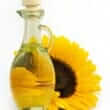Background
- Sunflower oil is derived from the seed of the sunflower plant (Helianthus annuus). Sunflower has been cultivated by Native Americans for centuries. They used the plant for dietary, medicinal, and decorative purposes.
- Sunflower oil has been used historically as a topical anti-inflammatory and pain reliever, and it is taken by mouth to relieve constipation and ulcers and to treat infection. Recent evidence of high vitamin E and polyunsaturated fatty acid content in sunflower oil has supported its possible role in reducing inflammation. In recent decades, sunflower oil has been recognized as a low-cholesterol cooking oil with a healthier fatty acid profile than many alternatives.
References
- AbuMweis SS, Vanstone CA, Ebine N, et al. H. Intake of a single morning dose of standard and novel plant sterol preparations for 4 weeks does not dramatically affect plasma lipid concentrations in humans. J Nutr 2006;136(4):1012-1016. View Abstract
- Aguilera CM, Mesa MD, Ramirez-Tortosa MC, et al. Sunflower oil does not protect against LDL oxidation as virgin olive oil does in patients with peripheral vascular disease. Clin Nutr 2004;23(4):673-681. View Abstract
- Binkoski AE, Kris-Etherton PM, Wilson TA, et al. Balance of unsaturated fatty acids is important to a cholesterol-lowering diet: comparison of mid-oleic sunflower oil and olive oil on cardiovascular disease risk factors. J Am Diet Assoc 2005;105(7):1080-1086. View Abstract
- Cater NB, Heller HJ, Denke MA. Comparison of the effects of medium-chain triacylglycerols, palm oil, and high oleic acid sunflower oil on plasma triacylglycerol fatty acids and lipid and lipoprotein concentrations in humans. Am J Clin Nutr 1997;65(1):41-45. View Abstract
- Declair V. The usefulness of topical application of essential fatty acids (EFA) to prevent pressure ulcers. Ostomy Wound Manage 1997;43(5):48-52, 54. View Abstract
- Demonty I, Chan YM, Pelled D, et al. Fish-oil esters of plant sterols improve the lipid profile of dyslipidemic subjects more than do fish-oil or sunflower oil esters of plant sterols. Am J Clin Nutr 2006;84(6):1534-1542. View Abstract
- Elmadfa I, Park E. Impact of diets with corn oil or olive/sunflower oils on DNA damage in healthy young men. Eur J Nutr 1999;38(6):286-292. View Abstract
- Ferrara LA, Raimondi AS, d'Episcopo L, et al. Olive oil and reduced need for antihypertensive medications. Arch Intern Med 2000;160(6):837-842. View Abstract
- Filteau SM, Lietz G, Mulokozi G, et al. Milk cytokines and subclinical breast inflammation in Tanzanian women: effects of dietary red palm oil or sunflower oil supplementation. Immunology 1999;97(4):595-600. View Abstract
- Higdon JV, Liu JJ, Du SH, et al. Supplementation of postmenopausal women with fish oil rich in eicosapentaenoic acid and docosahexaenoic acid is not associated with greater in vivo lipid peroxidation compared with oils rich in oleate and linoleate as assessed by plasma malondialdehyde and F(2)-isoprostanes. Am J Clin Nutr 2000;72(3):714-722. View Abstract
- Hill AM, Buckley JD, Murphy KJ, et al. Combining fish-oil supplements with regular aerobic exercise improves body composition and cardiovascular disease risk factors. Am J Clin Nutr 2007;85(5):1267-1274. View Abstract
- Kuriyan R, Gopinath N, Vaz M, et al. Use of rice bran oil in patients with hyperlipidaemia. Natl Med J India 2005;18(6):292-296. View Abstract
- Madigan C, Ryan M, Owens D, et al. Dietary unsaturated fatty acids in type 2 diabetes: higher levels of postprandial lipoprotein on a linoleic acid-rich sunflower oil diet compared with an oleic acid-rich olive oil diet. Diabetes Care 2000;23(10):1472-1477. View Abstract
- Perona JS, Canizares J, Montero E, et al. Virgin olive oil reduces blood pressure in hypertensive elderly subjects. Clin Nutr 2004;23(5):1113-1121. View Abstract
- Yago MD, Gonzalez V, Serrano P, et al. Effect of the type of dietary fat on biliary lipid composition and bile lithogenicity in humans with cholesterol gallstone disease. Nutrition 2005;21(3):339-347. View Abstract







